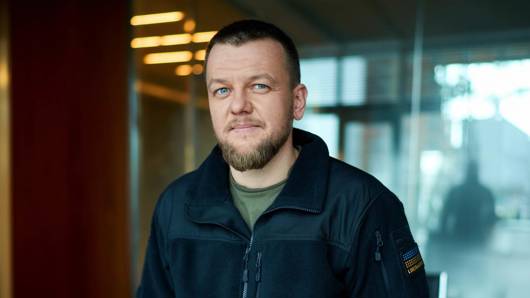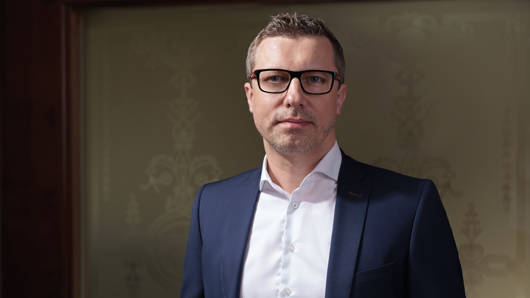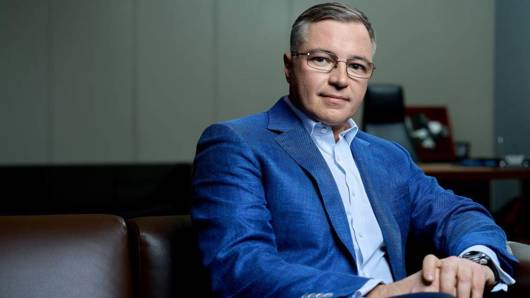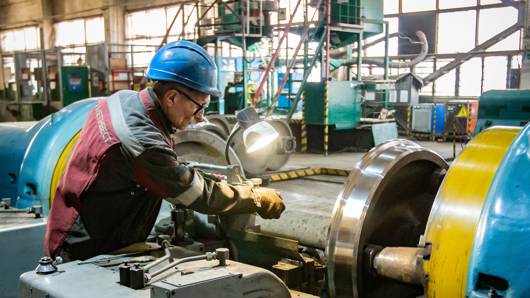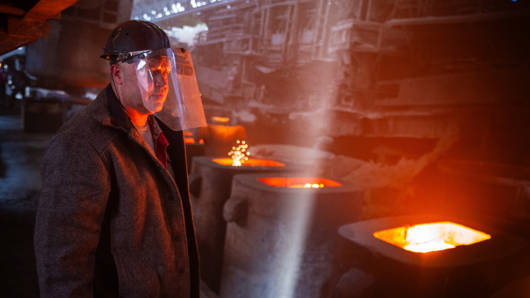At the Siderweb 2024 forum held on 26 September in Vicenza, Italy, Yuriy Ryzhenkov, CEO of Metinvest Group, spoke about expectations for the global steel market recovery, the main reasons for stopping imports of Russian semi-finished products to the European Union, the scrap market and the Group’s new plant in Italy.
Siderweb 2024 is the first annual forum dedicated to the current state and future of the steel industry in Italy and Europe. The event hosted over 500 participants, including representatives of major steel market players such as Marcegaglia, Danieli and Tata Steel. The main topics included global challenges, geopolitical influences and the latest scientific advances in steel production and construction.
Yuriy Ryzhenkov participated in the “Steel in Italy and the World: A Roundtable on the Future Challenges of the Industry” panel. It also featured Alessandro Brussi, chairman and CFO of Danieli; Fernando Espada, president of Eurometal and CEO of Tata Steel Distribution Spain; and Antonio Marcegaglia, president and CEO of Marcegaglia Steel.
Crisis in the global steel market
Yuriy Ryzhenkov said that the steel market, which is cyclical in nature, peaked in late 2021 and early 2022. Since then, the market has experienced a downturn due to the war in Ukraine, the worsening energy crisis, supply chain disruptions and economic uncertainty around the world.
According to him, 2022-23 was a period when the world was trying to cope with the consequences of the war that broke out in the centre of Europe. Now, military conflict in the Middle East is adding to the situation.
In 2024, Metinvest has been adapting to the new reality. The Group has improved its financial results from a low base in 2023, built new logistics and created new partnerships.
In my view, we are experiencing the longest downturn in the steel cycle in the last 20 years. It has been going on for more than three years. A turnaround in the market and a revival in consumption should happen in 2025.
— Yuriy RYZHENKOVHe added that the previous downturn in the steel market in early 2000 lasted less than a year and a half, and the one in 2008-09 a few months.
Over the past year, the European steel market has been the most volatile, with imports now accounting for more than 27% of Europe’s apparent steel consumption. High energy prices and conflicts have complicated the situation.
Yuriy Ryzhenkov hopes that the US government’s actions to lower its interest rate and the stimulus package recently implemented by the Chinese government will lead to a market turnaround.
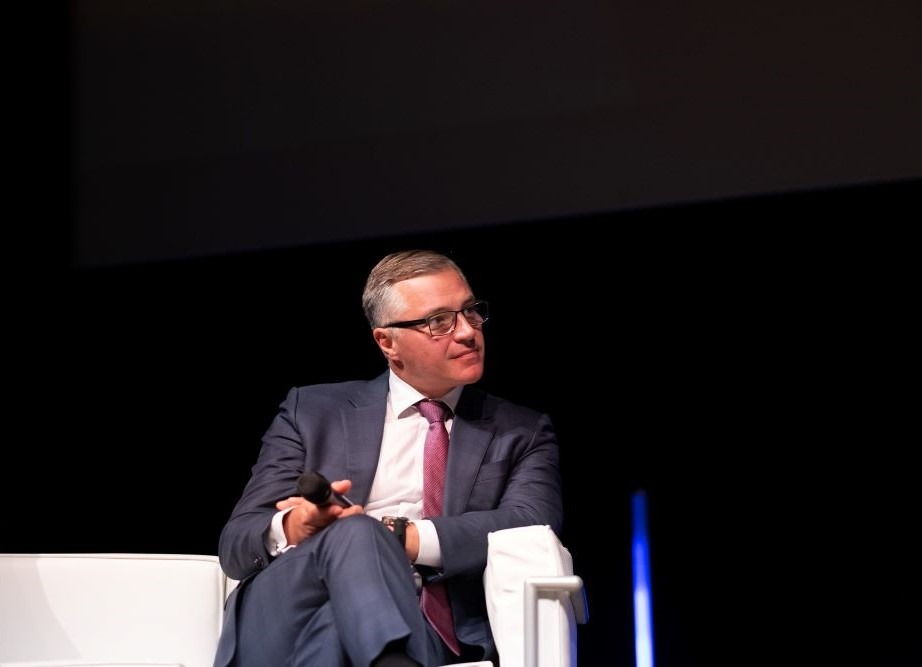
EU sanctions on imports of Russian semi-finished products
Metinvest’s CEO said that the EU should close all loopholes for imports of Russian semi-finished products as soon as possible.
According to him, Russia has always used its resources to control, attack and make countries dependent on its will. Ukraine has experienced this over the past 30 years. Russia has also blackmailed Europe in various ways using gas supplies.
Yuriy Ryzhenkov added: “Nothing prevents Russia from using semi-finished products as a weapon if it realises that Europe is dependent on these Russian products. This is one of the reasons why Europe must try to minimise imports as much as possible.”
Another significant reason for stopping Russian imports is the financing of military aggression through product purchases from Russia.
The Metinvest CEO said: “Every time you buy Russian slabs, pig iron or hot briquetted iron, you are financing the war against Ukraine. In fact, every euro you pay for such products goes to kill another Ukrainian.”
The third reason for minimising imports from Russia is the subsidisation of semi-finished product imports by Russian energy companies, which sell gas to steelmakers domestically at a cheaper price than in Europe. He added: “So, this is a highly subsidised product. You are killing European civilians.”
Yuriy Ryzhenkov noted that the Group does not buy Russian slabs for European rolling mills, saying: “Ilva supplied most of the slabs to our Italian plants. In this way, we are helping the Italian economy to revive one of the largest steel assets, which is in a difficult situation. And if all other producers did the same, it might be much easier to build a new steel industry in Italy.”
Competition in the Italian scrap market
The Metinvest CEO said that scrap is currently mainly used in the electrometallurgy. An alternative option is to mix scrap with other metal components, such as HBI (hot briquetted iron), DRI (direct reduced iron) or pig iron. This depends on the quality, steel grade required for processing and end use.
According to him, demand for equipment to process low-quality scrap into a clean product is growing. While such equipment used to be in demand from procurers, it is now becoming more commonplace for steelmakers, which use it before smelting.
Yuriy Ryzhenkov said: “This trend is spreading all over the world: it is a global requirement. Of course, the availability of DRI, HBI or pig iron will increase over time. As for scrap, while it is under temporary pressure, it will become more affordable in the future.”
Another raw material trend is the creation of charges using scrap that customers need to produce a specific steel grade.
The Metinvest CEO said: “The industrialisation of scrap processing is becoming a reality, not only as a source of raw materials but also as a production of semi-finished products.”
A new plant in Italy that will use Ukrainian raw materials
Yuriy Ryzhenkov noted that the new enterprise, which the Group intends to build together with Italian company Danieli, will combine efficiency, quality and environmental friendliness.
Metinvest considered building a plant in Eastern Europe and the Balkans and chose Italy after analysing logistics, demand and supply of raw materials. The initial idea was to launch a rolling mill that would use slabs from Azovstal to produce coils in Italy. After the destruction of the Mariupol plant by the Russians, however, the project was transformed into a full-fledged steel mill.
Metinvest’s Kryvyi Rih mining and processing plants will supply raw materials to the plant. The Group is also considering building a DRI/HBI production facility in Ukraine.
According to Yuriy Ryzhenkov, Italy is the largest importer of steel products in the EU, bringing in more than 6 million tonnes of hot-rolled coil annually.
He added: “The creation of domestic production of such a vital product will make the Italian economy much more resilient and strategically stable. It will also revitalise the region where the project is being implemented, open up new opportunities for the development of local industries, and become an additional source of materials.”
The Metinvest CEO said that the Group expects to finalise the programme and secure agreements within the next few months. Construction is due to start after the financing structure is agreed.






